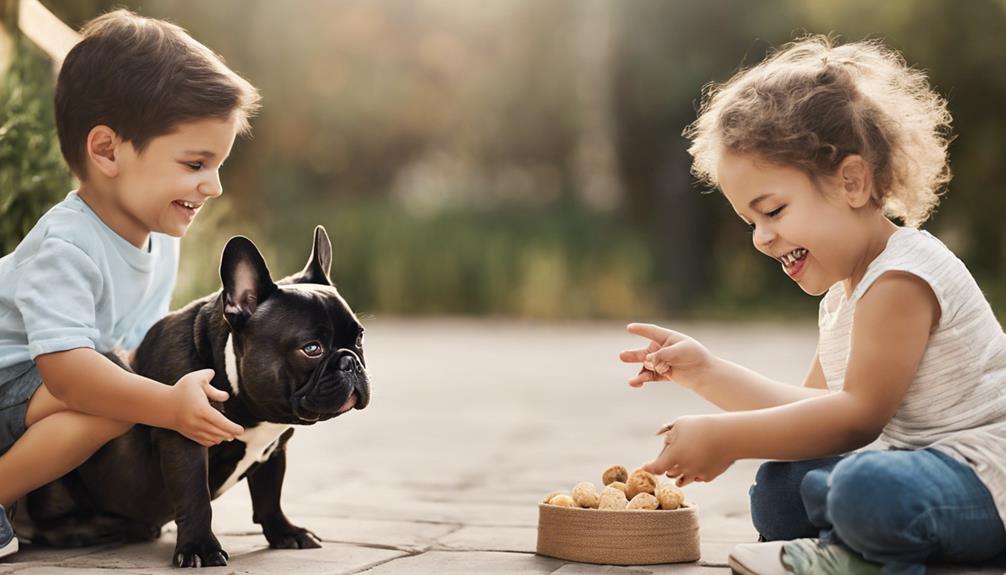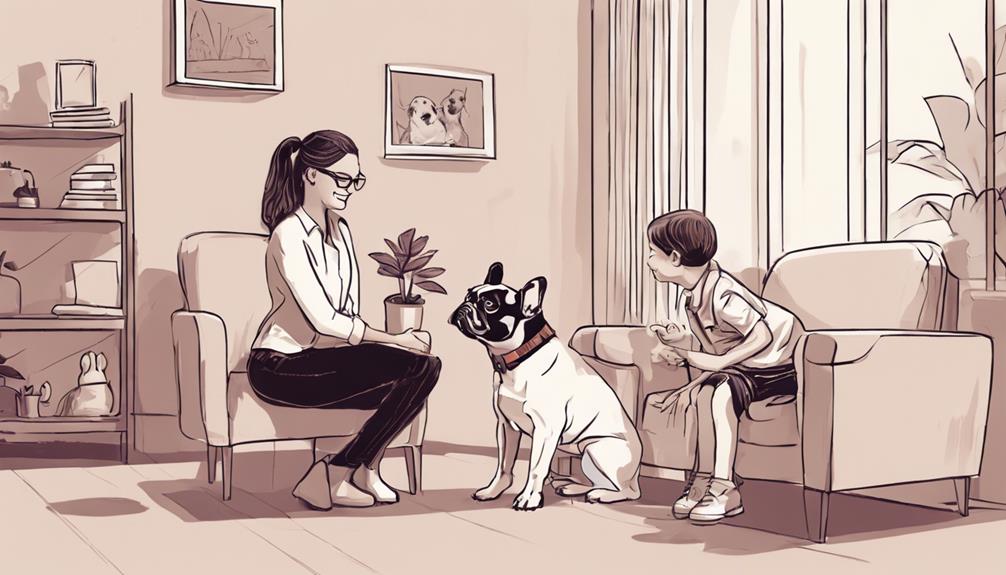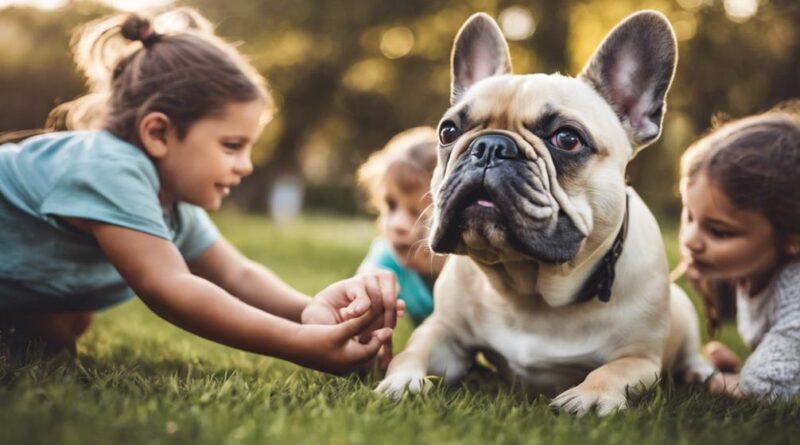9 Best Solutions to French Bulldog-Kids Issues
To handle French Bulldog-kids issues effectively, start by setting clear boundaries and rules for their well-being. Supervise playtime closely to ensure safety and positivity. Train both the child and dog with simple commands and positive reinforcement. Keep them active and engaged with adequate exercise tailored to their needs. Create safe spaces and address anxiety triggers for peace of mind. Socialize early and reinforce positive behavior with rewards. Teach respect and empathy through boundaries. Consider seeking professional help if needed for behavioral challenges. These 9 solutions will transform your pet and child's relationship positively.
Setting Boundaries and Rules
When raising a French Bulldog, establishing clear boundaries and rules is crucial for their well-being and your peace of mind. These adorable companions thrive on routine and structure. By establishing routines early on, you're providing a sense of security and predictability for your French Bulldog. Start with consistent feeding times, walks, playtime, and bedtime to help them feel secure and understand what's expected of them.
Consistent discipline is also key when setting boundaries for your French Bulldog. Use positive reinforcement to reward good behavior and redirect or ignore unwanted behaviors. French Bulldogs are sensitive to their owners' reactions, so consistency in your responses is essential. Whether it's a firm 'no' for jumping on furniture or a gentle redirection when they start chewing on something they shouldn't, make sure your responses are predictable and appropriate.
Supervising Playtime
To ensure a positive and safe playtime experience for your French Bulldog, it's important to actively supervise their interactions and activities. Playtime supervision is crucial to prevent any potential issues that may arise during playdates or regular play sessions with children. By monitoring their interactions closely, you can ensure that both your dog and the children are respecting each other's boundaries and playing appropriately.
During playtime, it's essential to establish playdate etiquette. Teach children how to approach and interact with your French Bulldog, emphasizing the importance of gentle behavior and respect for the dog's space. Encourage them to engage in calm activities and avoid rough play that could agitate or overwhelm your pet. Additionally, keep an eye on the dog's body language for any signs of discomfort or stress, and be ready to intervene if necessary.
As you supervise playtime, focus on monitoring the interactions between your French Bulldog and the children. Look for any signs of behavior that may require redirection, such as excessive barking, growling, or rough play. In such instances, calmly intervene, redirecting both the dog and the child towards more appropriate behavior. By actively participating in playtime supervision and guiding interactions, you can create a harmonious and enjoyable environment for both your French Bulldog and the children.
Training Both Child and Dog
Engage in training sessions that involve both your child and French Bulldog to foster a positive and respectful relationship between them. Behavior management plays a crucial role in ensuring harmony between your child and furry companion. Teaching your child how to interact with the French Bulldog in a gentle and understanding manner is key. Likewise, training your French Bulldog to respond appropriately to your child's actions is equally important.
Communication skills are vital in bridging the gap between your child and French Bulldog. Encourage your child to use clear and simple commands when interacting with the dog. This not only helps in managing the dog's behavior but also enhances your child's confidence in handling the pet. Additionally, teach your French Bulldog to understand cues from your child, such as recognizing when the child wants to play or when they need space.
Consistency is key in training both your child and French Bulldog. Set clear boundaries for both parties and ensure that these boundaries are respected. By establishing consistent rules and routines, you create a structured environment that promotes positive interactions between your child and pet. Remember, patience and positive reinforcement are essential in building a strong and lasting bond between your child and French Bulldog.
Providing Adequate Exercise
Ensuring your French Bulldog receives sufficient exercise is essential for their physical and mental well-being. These playful pups thrive on being active, and there are various ways you can provide them with the exercise they need.
Outdoor activities are a fantastic way to keep your French Bulldog engaged and active. Taking them for daily walks or hikes can help burn off excess energy and maintain a healthy weight. Consider incorporating interactive games like fetch or frisbee to make the exercise sessions more enjoyable for both you and your furry friend.
In addition to outdoor activities, indoor games can also be beneficial, especially during unfavorable weather conditions. Interactive toys like puzzle feeders or hide-and-seek games can stimulate your French Bulldog's mind while keeping them physically active.
It's important to tailor the exercise routine to your dog's age, health, and energy levels. Younger French Bulldogs may require more vigorous activities, while older ones might prefer shorter and more leisurely strolls. Monitoring your dog's response to different types of exercises can help you determine what works best for them.
Creating Safe Spaces
Creating a safe space for your French Bulldog is crucial for their well-being and peace of mind. French Bulldogs, like many other breeds, can experience anxiety triggers that may lead to stress and behavioral issues. To help your furry friend feel more at ease, consider creating calm environments within your home.
One way to achieve this is by designating a specific area as your French Bulldog's safe space. This can be a cozy corner in a room where they can retreat when feeling overwhelmed. Make sure this area is comfortable, with their bed, favorite toys, and maybe a piece of your clothing that carries your scent to provide reassurance.
Managing anxiety triggers is also essential in creating a safe space. Identify what situations or stimuli cause stress for your French Bulldog and work on minimizing their exposure to these triggers. Whether it's loud noises, new people, or certain activities, try to create a predictable routine that avoids these stressors whenever possible.
Additionally, consider using calming aids such as pheromone diffusers or soothing music to help create a serene atmosphere for your French Bulldog. Remember, a safe space isn't only a physical location but also a state of mind where your pet feels secure and protected. By addressing anxiety triggers and creating peaceful surroundings, you can help your French Bulldog feel more relaxed and content in their home.
Socializing Early and Often
To help your French Bulldog build confidence and adaptability, exposing them to various people, animals, and environments from a young age is key. Socializing early and often is crucial for your Frenchie to grow into a well-rounded and well-behaved companion. When it comes to playdate etiquette, start with small, controlled interactions before gradually introducing them to larger groups or new settings. This gradual exposure can help prevent overwhelming your pup and ensure positive social experiences.
Behavior management plays a significant role in socializing your French Bulldog. Monitor your Frenchie's behavior during interactions with others and intervene if necessary. If you notice any signs of discomfort or aggression, remove your dog from the situation calmly and redirect their attention to something positive. Consistency is key in addressing any behavioral issues that may arise during socialization.
Remember that every dog is unique, and some may require more time and patience when socializing. Be patient and understanding as your Frenchie navigates new social interactions. Positive reinforcement can also be beneficial in encouraging good behavior during socialization. Stay tuned for the next subtopic, where we'll delve into rewarding positive behavior to further enhance your French Bulldog's social skills.
Rewarding Positive Behavior

Encouraging and reinforcing desirable behaviors in your French Bulldog is essential for fostering positive social skills. Consistent reinforcement of good behavior leads to positive results in shaping your dog's interactions with kids. When your French Bulldog behaves well around children, it's crucial to reward them promptly. This reinforcement helps them understand what actions are desirable, making them more likely to repeat them in the future.
Positive reinforcement can take various forms, such as verbal praise, treats, or extra playtime. By consistently rewarding your French Bulldog for positive interactions with kids, you're encouraging teamwork and mutual respect between your pet and your children. This creates a harmonious environment where both parties feel appreciated and understood.
When your dog displays behaviors that align with your expectations, seize the opportunity to reinforce them positively. Whether it's sitting calmly while your child plays nearby or responding well to commands, acknowledging these actions can reinforce their good behavior. Over time, this positive reinforcement will help your French Bulldog associate being around kids with positive experiences, strengthening their bond and ensuring a safe and enjoyable environment for both your pet and your children.
Teaching Respect and Empathy
Teach your French Bulldog respect and empathy by setting clear boundaries and consistently modeling gentle interactions with children. Building relationships between your Frenchie and your kids is crucial for fostering a positive and respectful environment. Start by establishing rules that both your dog and children must follow, such as no rough play or invading personal space. Consistency is key in reinforcing these boundaries, so make sure everyone in the family is on the same page.
To encourage empathy in your French Bulldog, involve your kids in their care routine. Show them how to gently pet and interact with the dog, emphasizing the importance of being kind and considerate. When your Frenchie displays good behavior around children, reward them with treats and praise to reinforce positive interactions.
Communication is essential in teaching respect and empathy. Encourage your kids to express their feelings and boundaries clearly to both the dog and other family members. Likewise, pay attention to your dog's body language and signals to prevent any misunderstandings that could lead to conflicts. By fostering open communication and understanding between your French Bulldog and kids, you can create a harmonious and respectful relationship based on empathy and mutual respect.
Seeking Professional Help if Needed

If you encounter challenges in establishing boundaries or fostering positive interactions between your French Bulldog and kids, consider seeking professional help to address any underlying issues effectively. Parental guidance plays a crucial role in managing the relationship dynamics between your pet and children. A professional trainer or behaviorist can provide valuable insights and techniques to improve communication skills within the family unit.
Behavioral therapy for your French Bulldog can be beneficial in addressing any aggressive tendencies or anxiety that may be contributing to the issues with your kids. By understanding the root cause of your pet's behavior, you can work towards creating a harmonious environment for everyone involved. Additionally, dog training sessions can help reinforce positive behaviors and establish clear expectations for both your furry friend and your children.
Remember that seeking professional help isn't a sign of failure but rather a proactive step towards resolving any challenges you may be facing. These experts have the knowledge and experience to tailor strategies that suit your specific situation. By investing in professional assistance, you demonstrate a commitment to the well-being of both your French Bulldog and your kids, fostering a safe and loving environment for all.
Frequently Asked Questions
How Can I Manage Jealousy Between My French Bulldog and My Child?
To manage jealousy between your French Bulldog and child, start by building trust through positive reinforcement. Set clear boundaries and ensure all interactions are supervised. Encourage good behavior with treats and praise.
Slowly introduce them to each other's scents and sounds before allowing direct contact. Monitor their interactions closely and intervene if necessary. With patience and consistency, you can help foster a positive relationship between your furry friend and your child.
What Should I Do if My Child Is Afraid of the French Bulldog?
If your child is afraid of the French Bulldog, start by building trust between them. Use desensitization techniques like gradual exposure to help your child become more comfortable.
Encourage positive interactions and offer treats when they interact. Be patient and supportive throughout the process, and praise both your child and the dog for their progress.
With time and consistent effort, your child's fear can diminish, and a bond between them can develop.
Is It Normal for My French Bulldog to Be Possessive of My Child?
It's not uncommon for French Bulldogs to be possessive of children. Training techniques can help address this behavior. Start by setting clear boundaries and using positive reinforcement when your dog behaves appropriately around your child.
Consistency is key in reinforcing good behavior and discouraging possessiveness. Seek guidance from a professional trainer to ensure you're using effective methods tailored to your specific situation.
How Do I Prevent My Child From Accidentally Hurting the French Bulldog?
To prevent your child from accidentally hurting the French Bulldog, supervision is key. Make sure you're always around when they interact.
Training both your child and dog on gentle behavior is crucial. Establish clear boundaries and teach your child how to communicate with the dog properly.
What Should I Do if My French Bulldog Shows Aggression Towards My Child?
If your French Bulldog displays aggression towards your child, start with behavior modification and training techniques. Consistent positive reinforcement can help alter your dog's behavior.
Implement safety measures such as separating them when needed. Seek professional help if the aggression persists. It's crucial to address this issue promptly to ensure a safe environment for both your child and your pet.
Prioritize their well-being and take proactive steps to address the situation effectively.
Conclusion
In conclusion, navigating the relationship between a French Bulldog and kids requires patience, consistency, and understanding.
By setting boundaries, supervising playtime, and providing proper training and exercise, you can create a harmonious environment for both your dog and children.
Remember to reward positive behavior, teach respect and empathy, and seek professional help if needed.
With dedication and effort, you can ensure a safe and happy relationship between your French Bulldog and kids.
